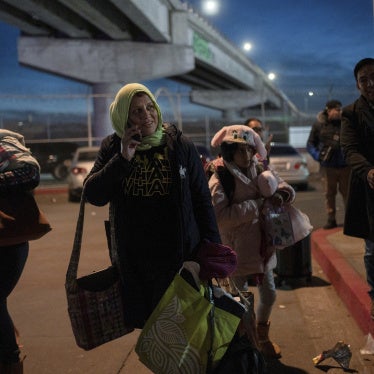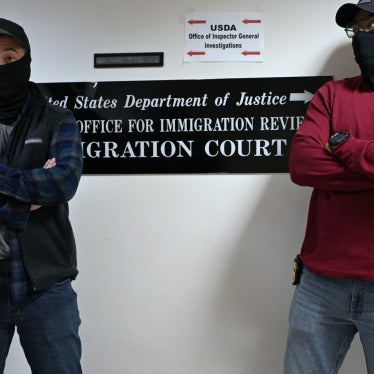Something similar is happening at the U.S.-Mexico border and on the Mediterranean. In both places, lifesaving and rights-respecting policies are being blamed for a surge in migrants and asylum seekers.
Italy started a rescue-at-sea operation called Mare Nostrum in response to the drowning of 360 boat migrants in October. In the first six months of this year, 65,000 boat migrants arrived in Italy, an eightfold increase over the same period in 2013.
And in the United States, in response to horror stories of the trafficking of children Congress passed an anti-trafficking law in 2008 that provided full hearings for unaccompanied children from noncontiguous countries. While waiting for claims for protection to be heard, they are released to families or other sponsors rather than being detained. So far this fiscal year, more than 57,000 unaccompanied Central American children have arrived at the U.S. border.
These are large numbers, but a little global perspective is warranted. Syria's neighbors in the Mideast, for example, are hosting more than 2.5 million Syrian refugees. Based on absolute numbers, or on the ability to absorb newcomers as a factor of GDP and population, the industrialized countries do not bear nearly the refugee burden of a Kenya, Jordan, Thailand or scores of other nations.
Regardless of how the refugee burdens compare, however, the United States and Europe have met the latest influx of migrants with a groundswell of negativity. Many in the United States are calling on President Obama to make changes in policy or the law so that "irregular migrants" can be quickly removed, with only cursory consideration of their protection claims. European Union governments have refused to give political and financial backing to Mare Nostrum, calling instead for tougher action against smugglers. Italian opposition parties want to shut down the rescue operation altogether.
These are not just knee-jerk, xenophobic howls. The chronology of events suggests that protective laws and policies may have been a pull factor for migrants. It is likely that smugglers and other criminals are profiting from these irregular migration streams, and that some of the migrants will not qualify as refugees.
Humane solutions are not quick, easy or cheap, but they are manageable for relatively rich democratic societies.-
But credible assessments indicate that many of the new arrivals are legitimately in need of international protection. A 2014 study by the U.N. High Commissioner for Refugees found that 58% of unaccompanied and separated Central American children arriving in the United States face the kind and level of harm in their home countries that indicates a need for international protection. The Italian government has estimated that 80% of boat migrants this year, many from Syria, Somalia and Eritrea, qualify for formal refugee status or other forms of protection.
There are many possible approaches to handling these influxes, but fast-track processing that cuts corners on due process should not be one of them. The process of sorting out claims for protection cannot be hurried without risking errors that could have life-and-death consequences, and the fact that children are involved makes this process even more difficult. Whether a child qualifies for protection involves complex legal considerations, such as whether the child meets the refugee definition, whether he or she is controlled by traffickers and whether the home government can provide protection from further abuse; and if the child is to be deported, have arrangements been made to properly receive and re-integrate him or her?
So, what is to be done?
Greater attention must be paid to improving human rights conditions and insecurity in the countries of origin and the countries of transit, but this is a long-term effort and will not help solve the immediate problem.
For the short term, both the United States and the EU have the capacity to bear the costs of providing fair and efficient processing as well as decent reception conditions. What is lacking is the political will to bear these costs. Equitable burden-sharing among the American states and European nations would transform these situations from crises into manageable problems, but political wrangling has stymied attempts to distribute costs and responsibilities.
In addition to providing financial support and joining in the Mare Nostrum rescue operation, EU leaders could approve measures that would relieve Italy's burden by, for example, transferring asylum seekers among the 27 other EU member states, according to their capacity. In the United States, Obama's request for $3.7 billion in additional funding to respond to the border influx has, thus far, largely produced congressional posturing rather than serious debate on whether the funding will be used to protect children's rights.
Humane solutions are not quick, easy or cheap, but they are manageable for relatively rich democratic societies. Such societies bear a particular responsibility to serve as models of behavior for countries with far less capacity that receive far larger numbers of refugees. The real burden on the United States and Italy is to show that even large numbers of migrants and asylum seekers can be treated fairly and efficiently without sacrificing basic due process protections and respect for human dignity.
Bill Frelick is the director of Human Rights Watch's refugee program.








